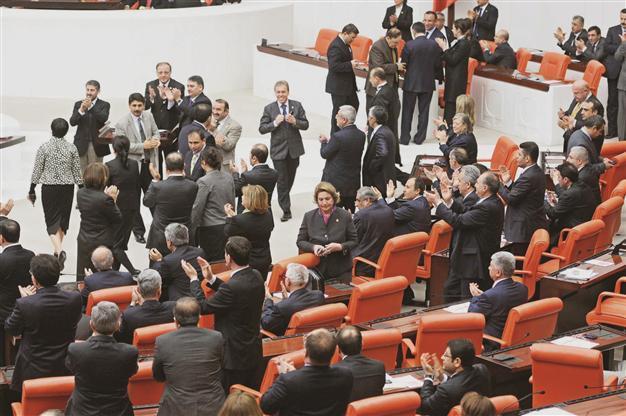Education bill passes amid deputies’ combat
ANKARA - Hürriyet Daily News

Deputies from the ruling Justice and Development Party greet the vote with applause, while Prime Minister Recep Tayyip Erdoğan was expected to host a celebratory event for his lawmakers later in the evening. DAILY NEWS photo, Selahattin SÖNMEZ
The ruling Justice and Development Party (AKP) steamrolled through Parliament the controversial bill that would profoundly overhaul Turkey’s education system and introduce the Quran as an elective course, defying opposition objections and street protests.AKP lawmakers greeted the vote with applause as Education Minister Ömer Dinçer hailed the bill as “a historic step toward reconciling the people and the state.” The Turkish education system will no longer raise “prototype people,” he said.
Prime Minister Recep Tayyip Erdoğan was expected to host a celebratory event for his lawmakers later in the evening.
More tensions marred the last session March 30 as Republican People’s Party (CHP) members left the General Assembly during the debate of a provision that would exempt the procurement of tablet PCs from the Public Tender Law. Before they walked out, the lawmakers unfurled banners that accused the AKP of corruption. “Secularism is the safeguard of democracy,” other banners read.
Erdoğan said no one would be forced to take Quranic studies against their will. “Our people demanded the Quran and the life of our Prophet as elective courses in secondary and high schools. Nobody will be forced to take them. Why are they disturbed?” Erdoğan said late March 29. He defended the police clampdown on street protests against the bill, saying it was the police’s duty to prevent unauthorized events.
Deputy PM Bülent Arınç also hailed the Quranic studies clause. “Our nation is very pleased. The other elective courses will be determined by the Education Ministry,” he said March 30 in Kırşehir. Officials have said the elective courses may also include the Kurdish.
Fistfights and squabbles marked the marathon session early in the morning, forcing the suspension of the debate before it resumed again in the afternoon. When CHP deputy Veli Ağbaba described an unnamed AKP deputy as “devilish,” the AKP’s Mehmet Metiner responded by slapping him in the face. A proposal to formally reprimand Metiner was rejected with AKP votes. Infuriated, CHP deputy group chair Muharrem İnce said they were left with no other option but to attend the General Assembly with guns. He stepped back from his remarks March 30, saying they were the reflection of profound frustration with the AKP.
The legislation, which was submitted as a proposal by five AKP deputies rather than a Cabinet-approved draft, extends compulsory education from eight to 12 years, while breaking down the process to three tiers of four years each. The school-starting age is being brought down to five years, a move that would require simplifying the curriculum for first-graders. After four years of primary education, students could chose vocational schools, among them the imam-hatip religious schools which are currently open to secondary school graduates. The bill provides the option of home study in the third tier -- a contentious measure that critics say would encourage patriarchal families to take their daughters from school and marry them off.
















